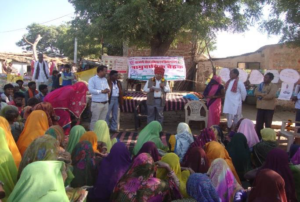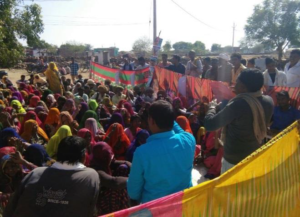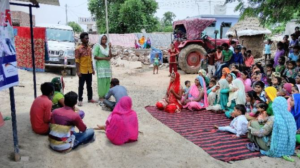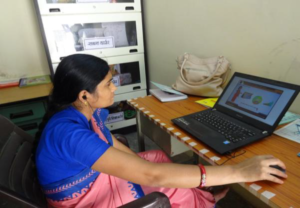Gender Sensitive Initiatives to Reduce Malnutrition: A Joint Action by the Food & Nutrition Security & Enhanced Resilience Programme (FaNS-GIZ) & Department of Women & Child Development to Improve Dietary Diversity among Women and Children in Madhya Pradesh (India)
“It has been the tradition for women and girls to eat last. This is how it has always been. No one dares to question the tradition”. (Pregnant woman, District Chhatarpur, Madhya Pradesh)
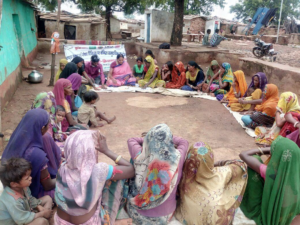
Context:
Maternal and child undernutrition is highly prevalent in underprivileged populations of India, especially in rural and tribal settings. Madhya Pradesh is one of the states in India where a large number of children are malnourished. The recent National Family Health Survey NFHS 4 data shows that 42% of children under 5 are stunted (low height for age), 25.8% are wasted (low weight for height) and 42.8% are underweight. Sheopur and Chhatarpur are among the most backward and remote districts of the Indian state Madhya Pradesh. Malnutrition, hunger and high infant and child mortality are common in these districts. Both are worse-placed regarding sex ratio (886 females per 1000 men in Chhatarpur and 901 in Sheopur), female literacy and poor access to public health and nutrition services. Difficult terrain in terms of challenging environmental conditions like lack of water, lack of diversified nutritious food and gender inequity often lead to young children, adolescent girls and pregnant women suffering from malnutrition and anemia.
Promoting Gender Equality: The GIZ Food & Nutrition Security & Enhanced Resilience Programme (FaNS) in India aims to improve dietary diversity among women of reproductive age and children (6-23 months) by strengthening the national system for the distribution of subsidized food (The Targeted Public Distribution System, TPDS), training Anganwadi workers (AWW, rural women health/nutrition workers) on nutrition diversity and empowering women with knowledge and practices on nutrition.
The awareness campaigns at the district and state level sensitize beneficiaries and decision makers about the importance of a nutritious and diversified diet to bring about sustainable changes concerning the availability, intake and preparation of high quality food. So far, our implementing partner Welthungerhilfe and their local NGOs have trained over 3000 AWWs on 4 Participatory Learning & Action (PLA) modules to improve their capacities and understanding on nutrition intake, diet diversity, pregnancy care, Infant and Young Child Feeding (IYCF) practices and availability of nutritious food through kitchen gardens.
Further, we have reached over 126210 women directly through 20 intensive awareness sessions using PLA. PLA exists of 20 meetings and that part of these meetings is the discussion on the daily inequalities which women face. The meetings give them a space where they can express their concerns. More than 150,000 women and men have been reached indirectly through community meetings and over 6987 kitchen garden have been set up at the household level empowering the women to grow and use the vegetables. Men in the community have also been involved through community meetings, wall paintings and community street theatres on similar issues. The kitchen garden approach has been replicated across the state as “Panchavati se Poshan’ (Nutrition Garden) by the Government partner, the same can be accessed in the link attached: http://esanchayika.mp.gov.in/(S(p5mg0z2jlltdlyqdztorziba))/new/navachar_se.aspx
Within this framework, GIZ FaNS in collaboration with Department of Women & Child Development (DWCD), Bhopal is developing an online virtual learning platform for Integrated Child Development Scheme (ICDS) Supervisors and Anganwadi workers in Madhya Pradesh.
This will ensure a standardized form of high quality training for 97,135 Anganwadi workers and 3,575 women supervisors across the state.
To promote nutrition and diet diversity at the local level, we had identified local food cuisines. Every recipe shows its nutritive value and the product was developed in the local language Hindi and is online available at the knowledge portal of DWCD.
http://esanchayika.mp.gov.in/(S(2qmrinfrwxgieu55di2vnl45))/new/recipes_se.aspx
To promote nutrition literacy and good nutritional practices at household level in the Indian state of Madhya Pradesh a nutrition calendar has been designed. The calendar highlights the importance of dietary diversity and how it can be achieved using locally available seasonal food. The calendar can be accessed at:
http://esanchayika.mp.gov.in/(S(2qmrinfrwxgieu55di2vnl45))/new/recipes_se.aspx
Gender as a quality feature of our work:
Through our gender sensitive initiatives, we could reach the last mile inaccessible tribal women who had the least knowledge on availability and accessibility of nutrition services. Through lot of initiatives in joint collaboration with DWCD for promoting Food & Nutrition Diversity through Kitchen Garden and Poshan Thali Campaign (Nutritious Plate), we have been recognized as an organization dedicated to improve the nutritional status of tribal and poor women among our Government partners in the state and district level. Through our community monitoring activities of TPDS like improving awareness on National Food Security Act, 2013 (ensuring food as a right for its citizens); improving the quality of subsidized food-grains for beneficiaries.
Considering the lower existing educational level of our AWWs , the virtual learning platform has been designed as an easy, interactive manner with visual effects for stimulating the interest and learning of AWW on complex nutritional topics, which has been well recognized by our Government partners.
Gender and Result Based Monitoring (RBM):
FaNS India has won funding under the GIZ Health Sector Network- Innovation Fund 2017 to develop a Global Monitoring Software platform to capture the processes and impacts of nutrition interventions on the beneficiaries.
i-Monitor is a windows based data and process management software to report process level data like reach or coverage of interventions to stakeholders and beneficiaries and also to capture result based indicators like Dietary Diversity scores, household consumption of nutrition food etc.). The software will act as a knowledge management tool for entering, compiling and synthesizing gender disaggregated data from different nutritional intervention projects currently being undertaken by GIZ in a systematic manner. The tool could be useful for GIZ projects to steer programmes based on real time evidence but also for local governmental partners who often lack precise data on beneficiaries from the ground.
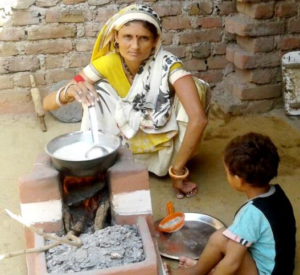
Cooperation:
For improving the nutritional status of women and children through gender sensitive interventions, we cooperate with two major ministries at national, state and district level. Further, we also involve international Non-Governmental Organization (NGO), Civil Society Organization (CSO) and local grassroots level NGOs to improve their capacity and approach, towards gender sensitive initiative to address malnutrition in our country. Also, we have engaged a right based organization, Self Employed Women’s Association (SEWA) to ensure rights of vulnerable women in accessing subsidized high quality food grains.
Convergence with the line ministries, international NGO, local CSOs with different priorities and different areas of work was a big challenge to address it and bringing all of them together to achieve the common goal of reducing malnutrition through our program.
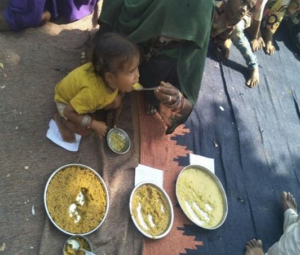
3 key success factors:
1. Malnutrition is a core issue prevailing in our country and has been identified by multiple stakeholders to address it through food and nutrition security enhancing measures. Since, nutritional status of women and children are largely affected by gender inequity, thus promoting nutrition diversity by adopting a gender sensitive approach is a key to success for our program.
2. Capacity building of health workers (AWWs and Supervisors) through PLA and online platform in convergence with government partner is well acknowledged.
3. Community level outreach with beneficiaries including last mile tribal women for improving their knowledge and practice on good nutrition behaviour is recognized by the government partners. Involving men and other community members is also the success factor for our program as they play an important role in decision making, purchasing diversified food from the market and support in developing kitchen gardens.

 GIZ Gender Website
GIZ Gender Website